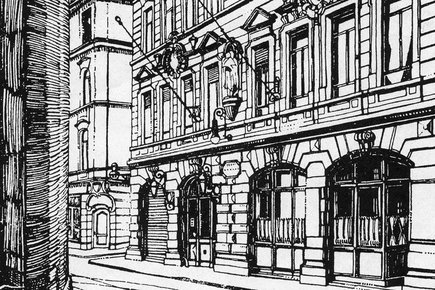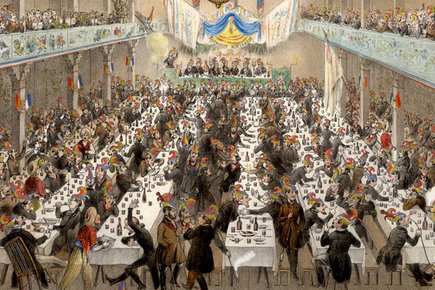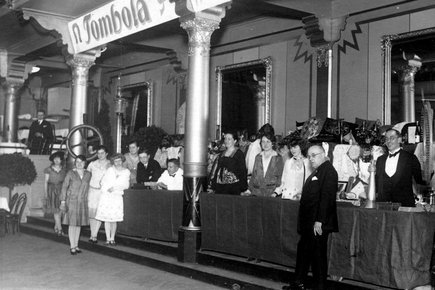


In 1834/35, the landlord Konrad Falck purchased the Zum Frankfurter Hof inn in Augustinerstrasse that took its name from its former owner, St. Bartholomew's Foundation in Frankfurt am Main. Falck added a hall to his building in order to meet the ever-growing demand for venues for the Mainz Carnival.
1841 Official opening of the Great Hall as the venue for the events of Mainz Carnival Association MCV. At that time, between 1832 and 1848, Mainz was "the most republican, most revolutionary German city, indeed a suburb of Paris" (Heinrich von Treitschke).
1847 The population was suffering from a disastrous famine, the last on a European scale. For this reason, all the events in the Carnival season were cancelled.
1848 The March Revolution puts an end to the Carnival campaign shortly before Shrove Monday. Triggered by the "initial spark" in Paris, the revolutionary movement in Mainz began on 28 February 1948 - namely with a wide public basis, not just in parliament as in many other parts of Germany. On that day, Mainz burghers discussed the demands they wanted to make to the government in Darmstadt with the delegate and popular Carnival president, Franz Zitz. This date basically marked the start of political clubs and societies in Mainz.
Politics now dominated public life. The Frankfurter Hof became the political assembly room and meeting place for the committed bourgeois basis. At the beginning of May, the first democratic association was founded at the Frankfurter Hof with the goal of realising the German 'Social Republic'.
1855 The MCV returned to the Frankfurter Hof, but already on 18 November 1857, the explosion of the Powder Tower thwarted all the plans for the 1858 carnival campaign.
1863 The MCV celebrated its silver jubilee with magnificent gatherings at the Frankfurter Hof. On 20 May 2002, Ferdinand Lasalle, co-founder of the General German Workers' Association (Allgemeiner Deutscher Arbeiterverein - ADAV) gave a speech there in which he presented the cornerstones of his social and political theses. At that time, the Frankfurter Hof was the meeting place of the Workers' Education Association.
1864 Johann Falck III and Andreas Schmidt bought the building for the Catholic Reading Association, which was renamed the Casino Society in June 1864.
1865 The MCV asked the Casino Society to make the hall available to it for the carnival campaign events. The society gave its consent but subject to the condition that at the sittings, everything was to left out that "might offend religion, custom as well as the character of the Society. As a result of this, the MCV switched to the Fruit Market Hall until 1884 when it was able to move into the splendid City Hall , the predecessor of the Rheingoldhalle.
1871 General assembly of German Catholics at the Frankfurter Hof.
1890 One of the largest organisations within Germany's church, the People's Association for Catholic Germany, was brought into being at the Frankfurter Hof.
1938 The Frankfurter Hof served, among other things, as a reception camp for Jewish refugees from the villages of Rhine-Hesse.
1989 The foundation stone was laid for the renovation of the Frankfurter Hof after long political discussions and great commitment by a citizens' action group.
1991 Re-opening Frankfurter Hof on 10th March
2016 Anniversary "Frankfurter Hof - 25 years"
mainzplus CITYMARKETING GmbH
Rheinstr. 66
55116 Mainz
Germany
Telefon: +49 (0) 6131/242 - 0
Telefax: +49 (0) 6131/242 - 100
info(at)mainzplus.com